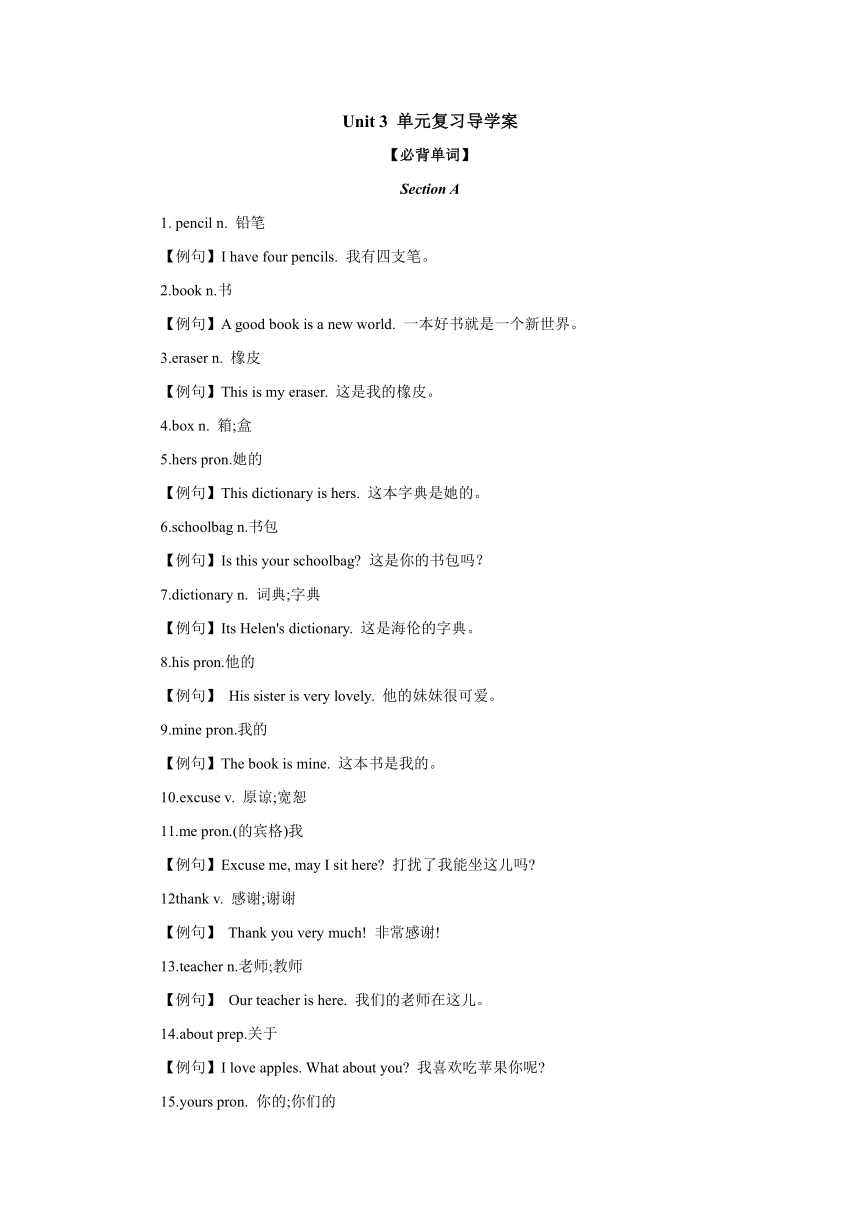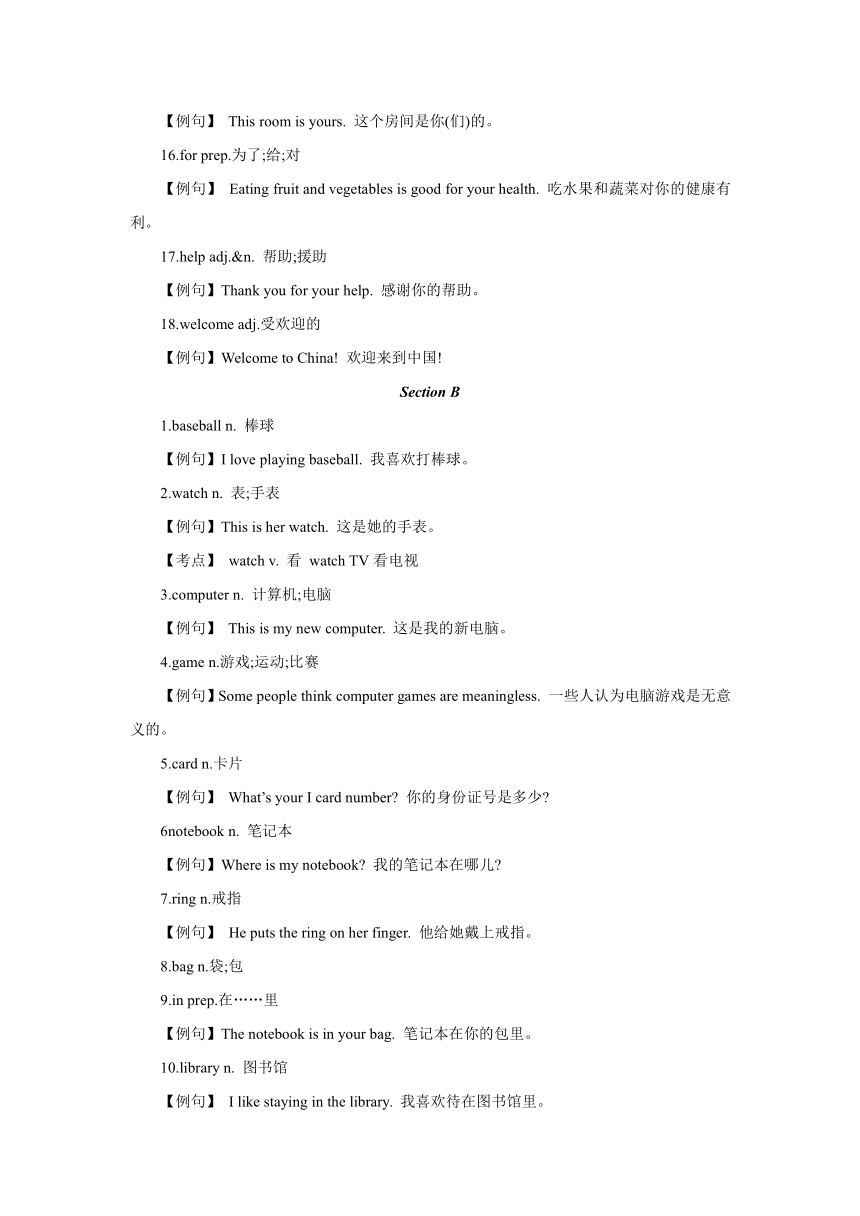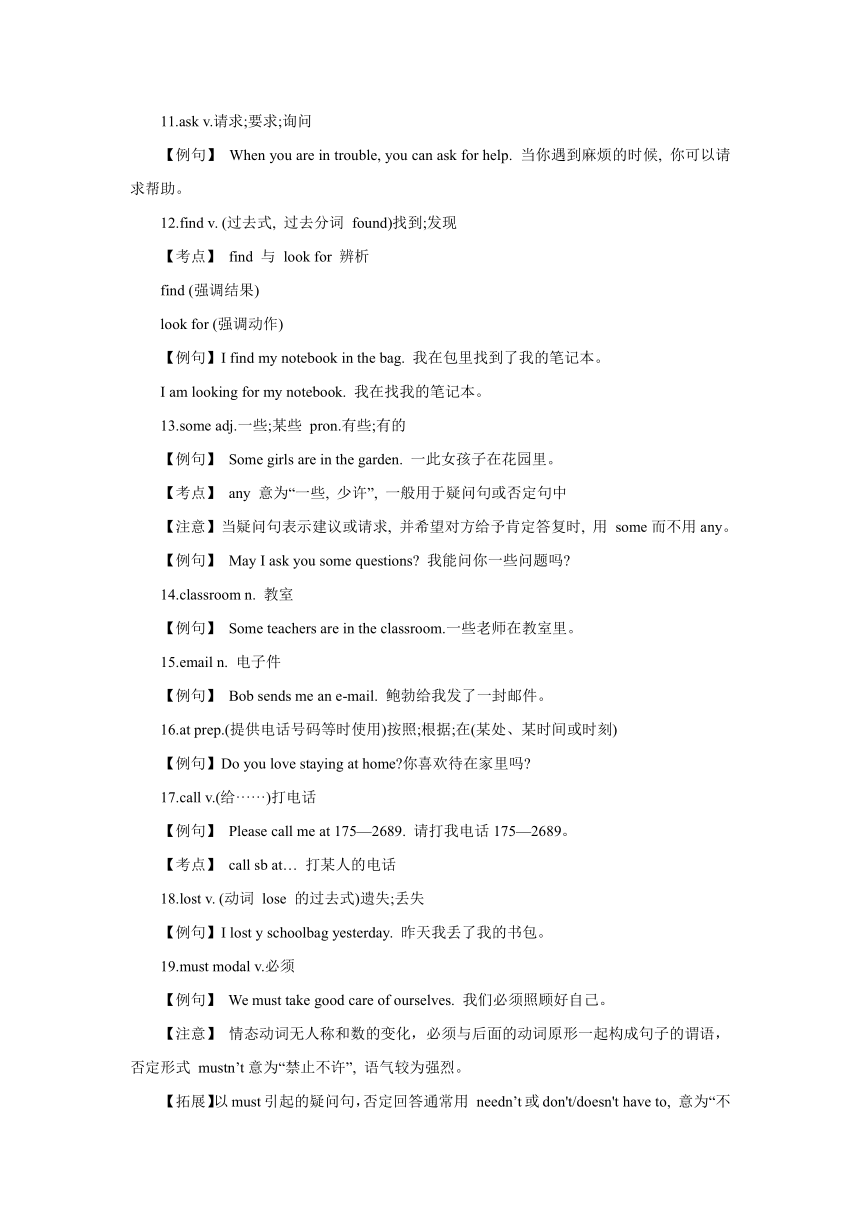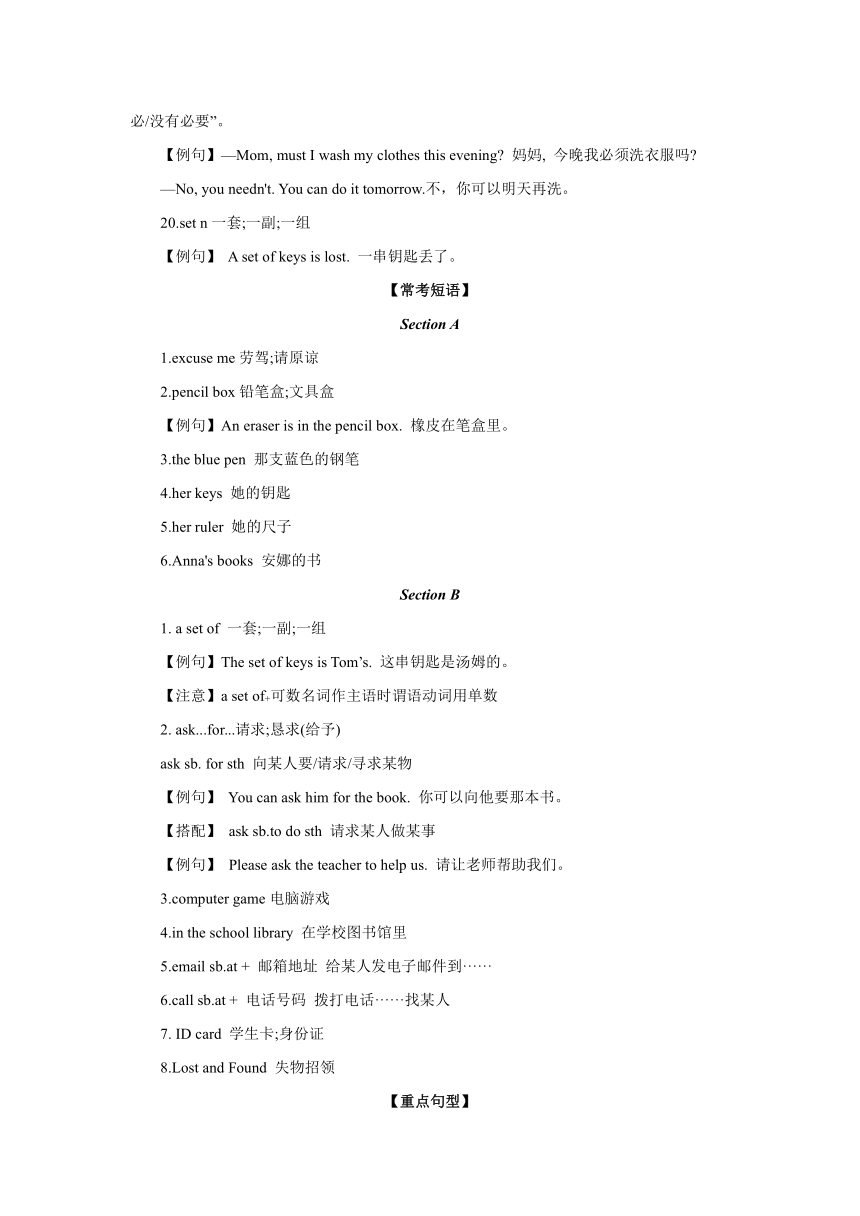人教版英语七年级上册Unit 3 Is this your pencil?单元复习 导学案
文档属性
| 名称 | 人教版英语七年级上册Unit 3 Is this your pencil?单元复习 导学案 |  | |
| 格式 | docx | ||
| 文件大小 | 21.8KB | ||
| 资源类型 | 教案 | ||
| 版本资源 | 人教新目标(Go for it)版 | ||
| 科目 | 英语 | ||
| 更新时间 | 2022-12-07 15:55:18 | ||
图片预览




文档简介
Unit 3 单元复习导学案
【必背单词】
Section A
1. pencil n. 铅笔
【例句】I have four pencils. 我有四支笔。
2.book n.书
【例句】A good book is a new world. 一本好书就是一个新世界。
3.eraser n. 橡皮
【例句】This is my eraser. 这是我的橡皮。
4.box n. 箱;盒
5.hers pron.她的
【例句】This dictionary is hers. 这本字典是她的。
6.schoolbag n.书包
【例句】Is this your schoolbag 这是你的书包吗?
7.dictionary n. 词典;字典
【例句】Its Helen's dictionary. 这是海伦的字典。
8.his pron.他的
【例句】 His sister is very lovely. 他的妹妹很可爱。
9.mine pron.我的
【例句】The book is mine. 这本书是我的。
10.excuse v. 原谅;宽恕
11.me pron.(的宾格)我
【例句】Excuse me, may I sit here 打扰了我能坐这儿吗
12thank v. 感谢;谢谢
【例句】 Thank you very much! 非常感谢!
13.teacher n.老师;教师
【例句】 Our teacher is here. 我们的老师在这儿。
14.about prep.关于
【例句】I love apples. What about you 我喜欢吃苹果你呢
15.yours pron. 你的;你们的
【例句】 This room is yours. 这个房间是你(们)的。
16.for prep.为了;给;对
【例句】 Eating fruit and vegetables is good for your health. 吃水果和蔬菜对你的健康有利。
17.help adj.&n. 帮助;援助
【例句】Thank you for your help. 感谢你的帮助。
18.welcome adj.受欢迎的
【例句】Welcome to China! 欢迎来到中国!
Section B
1.baseball n. 棒球
【例句】I love playing baseball. 我喜欢打棒球。
2.watch n. 表;手表
【例句】This is her watch. 这是她的手表。
【考点】 watch v. 看 watch TV看电视
3.computer n. 计算机;电脑
【例句】 This is my new computer. 这是我的新电脑。
4.game n.游戏;运动;比赛
【例句】Some people think computer games are meaningless. 一些人认为电脑游戏是无意义的。
5.card n.卡片
【例句】 What’s your I card number 你的身份证号是多少
6notebook n. 笔记本
【例句】Where is my notebook 我的笔记本在哪儿
7.ring n.戒指
【例句】 He puts the ring on her finger. 他给她戴上戒指。
8.bag n.袋;包
9.in prep.在……里
【例句】The notebook is in your bag. 笔记本在你的包里。
10.library n. 图书馆
【例句】 I like staying in the library. 我喜欢待在图书馆里。
11.ask v.请求;要求;询问
【例句】 When you are in trouble, you can ask for help. 当你遇到麻烦的时候, 你可以请求帮助。
12.find v. (过去式, 过去分词 found)找到;发现
【考点】 find 与 look for 辨析
find (强调结果)
look for (强调动作)
【例句】I find my notebook in the bag. 我在包里找到了我的笔记本。
I am looking for my notebook. 我在找我的笔记本。
13.some adj.一些;某些 pron.有些;有的
【例句】 Some girls are in the garden. 一此女孩子在花园里。
【考点】 any 意为“一些, 少许”, 一般用于疑问句或否定句中
【注意】当疑问句表示建议或请求, 并希望对方给予肯定答复时, 用 some而不用any。
【例句】 May I ask you some questions 我能问你一些问题吗
14.classroom n. 教室
【例句】 Some teachers are in the classroom.一些老师在教室里。
15.email n. 电子件
【例句】 Bob sends me an e-mail. 鲍勃给我发了一封邮件。
16.at prep.(提供电话号码等时使用)按照;根据;在(某处、某时间或时刻)
【例句】Do you love staying at home 你喜欢待在家里吗
17.call v.(给······)打电话
【例句】 Please call me at 175—2689. 请打我电话175—2689。
【考点】 call sb at… 打某人的电话
18.lost v. (动词 lose 的过去式)遗失;丢失
【例句】I lost y schoolbag yesterday. 昨天我丢了我的书包。
19.must modal v.必须
【例句】 We must take good care of ourselves. 我们必须照顾好自己。
【注意】 情态动词无人称和数的变化,必须与后面的动词原形一起构成句子的谓语,否定形式 mustn’t意为“禁止不许”, 语气较为强烈。
【拓展】以must引起的疑问句,否定回答通常用 needn’t或don't/doesn't have to, 意为“不必/没有必要”。
【例句】—Mom, must I wash my clothes this evening 妈妈, 今晚我必须洗衣服吗
—No, you needn't. You can do it tomorrow.不,你可以明天再洗。
20.set n一套;一副;一组
【例句】 A set of keys is lost. 一串钥匙丢了。
【常考短语】
Section A
1.excuse me劳驾;请原谅
2.pencil box铅笔盒;文具盒
【例句】An eraser is in the pencil box. 橡皮在笔盒里。
3.the blue pen 那支蓝色的钢笔
4.her keys 她的钥匙
5.her ruler 她的尺子
6.Anna's books 安娜的书
Section B
1. a set of 一套;一副;一组
【例句】The set of keys is Tom’s. 这串钥匙是汤姆的。
【注意】a set of+可数名词作主语时谓语动词用单数
2. ask...for...请求;恳求(给予)
ask sb. for sth 向某人要/请求/寻求某物
【例句】 You can ask him for the book. 你可以向他要那本书。
【搭配】 ask sb.to do sth 请求某人做某事
【例句】 Please ask the teacher to help us. 请让老师帮助我们。
3.computer game电脑游戏
4.in the school library 在学校图书馆里
5.email sb.at + 邮箱地址 给某人发电子邮件到······
6.call sb.at + 电话号码 拨打电话······找某人
7. ID card 学生卡;身份证
8.Lost and Found 失物招领
【重点句型】
Section A
1.What about this dictionary 这本词典(是谁的)呢
What about... 的同义句型为 How about... 是英语口语中常用的两个省略句型,它们的意思和用法基本相同,常常用在以下场合:
(1)向对方提出建议或请求。
【例句】What/How about some eggs 来点鸡蛋怎么样
(2)征询对方的看法或意见。
【例句】What about the English book (你认为)这本英语书怎么样
(3)寒暄时用来承接上下文。
【例句】I am from Beijing. What about you 我来自北京, 你呢
【提示】What about, ... 与How about, ... 的含义和用法相同,只是美国人更习惯用“How about... ”。当跟人称代词作宾语时, 要用其宾格形式。
【例句】What/How about him 他怎么样
2.Thank you for your help, Anna. 多谢你的帮助安娜。
Thank you for...相当于Thanks for...意为“因······感谢你”, 其中 for 为介词后面可接名词代词或动名词。常见的短语有: thank sb. for sth “因某事感谢某人”; thank sb. for doing sth.“因做某事而感谢某人”。
【例句】Thank you for your letter. 谢谢你的信。
Thank you for helping me. 谢谢你帮助我。
【注意】Thank you for…和Thanks for… 都是表达感谢的方式,在 for 的后边加上感谢的原因
3. You're welcome. 别客气。
welcome 此处用作形容词,意为“受欢迎的”。You’re welcome 是听到对方的道谢后做出的回应,意为“不客气”, 也可用Not at all. That's all right.等
【例句】—Thank you very much非常感谢
—You're welcome.不客气。
Section B
1. How do you spell it 你怎么拼写它
(1)这是一个由 how引导的特殊疑问句。do 是助动词,用来帮助构成疑问句或否定句。
how 为疑问副词, 在本句中是对某种方式、方法的提问,意思是“怎么样”。how 还可用来提问健康状况、程度、数量等
【例句】—How is your grandmother 你奶奶身体好吗
—She's very well. 她身体很好
—How do you come to school 你怎样来上学
—By bike. 骑自行车。
【拓展】常见的有关 how 的疑问词组有:how old 询问年龄;how much询问价格;how much/many 询问数量
(2)句中的 do为助动词,用来帮助实义动词 spell 构成疑问句。在一般现在时态中, 含有实义动词的陈述句变为一般疑问句时, 在句首加 do 或 does。当句中的主语为第三人称单数时, 用 does, 其余情况都用 do。无论 do 还是does 都无具体的意义,只起结构上的作用。
【例句】 He speaks English.他讲英语。(陈述句)
Does he speak English 他讲英语吗 (一般疑问句)
【拓展】do 作实义动词,意为“做”
do one's homework 做家庭作业
do housework 做家务
do exercises 做练习
【语法总结】
一、含有 be动词的疑问
1.一般疑问句是用来询问事情或某种情况是否属实,并需要对方用 yes 或 no 作出肯定或否定回答的问句。
2.含有 be 动词的一般疑问的结构及其答语为:
结构 Be动词(Am/Is/Are)+主语+其他?
肯定回答 Yes, 主语(人称代词)+be动词(am/is/are).
否定回答 No, 主语(人称代词)+be动词(am/is/are)+not.
—Is she your mother 她是你妈妈吗
Yes,she is./No, she isn't. 是的,她是我妈妈。/不, 她不是我妈妈。
【拓展】①一般疑问句中主语为 this/that 时答语中主语用 it。
—Is this/that your pen 这/那是你的钢笔吗
—Yes, it is./No, it isn't.是的, 它是。/不, 它不是。
②一般疑问句中主语为 these/those 时,答语中主语为 they。
—Are these/those his books 这此/那此是他的书吗 —Yes, they are./No, they aren't. 是的,它们是。/不,它们不是。
3.一般疑问的朗读语调:朗读一般疑问句用升调,其简略答语用降调
—Is that a baseball 那是一个棒球吗
—Yes, it is. /No, it isn’t. 的,它是。/不, 它不是。
4.含有be动词(am, is, are)的陈述句转换为一般疑问句的规则为将 be动词(am, is, are)提到句首(首字母要大写), 句末用间号。将陈述句中的主语I改为 you,遇到形容词性物主代词my 改为 your,其他的通常不变。
I am Zhang Yang. 我是张阳。
—Are you Zhang Yang 你是张阳吗
That is my bike. 那是我的自行车。
—Is that your bike 那是你的白行车吗
助记:
含有 be 动词的陈述变一般疑问句一调二改三间号。
“一调”即把 be 动词调至首;”改”即把 be 动词首字大写再把原句首字母小写(人名、地名等专有名词除外), 将人称代词I改为 you, 将形容词性物主代词my改为 your;“三问号”即在句末加上问号。
二、名词性物主代词
数 单数 复数
人称 第一人称 第二人称 第三人称 第一人称 第二人称 第三人称
名词性物主代词 mine 我的 yours 你的 his 他的 hers 她的 its 它的 ours 我们的 yours 你们的 theirs 他/她/它们的
2.名词性物主代词的用法:
(1)名词性物主代词在句中独立使用, 相当于“形容词性物主代词+名词”故其后不能接名词。
Look at the two pencils. The blue one is yours and the green one is mine.看这两支铅笔,蓝色的是你的, 绿色的是我的。
(2)名词性物主代词在句中可作主语、表语、宾语。用作主语时,谓语动词的数应随所指者的数而定。
—Is this ruler yours or hers 这把尺子是你的还是她的
—It's mine. Hers is in her bag. (Hers—Her ruler)它是我的。她的尺子在她包里。
—Whose books are these 这些是谁的书 —They are his. Yours are over there.(Yours—Your books)它们是他的。你的书在那边。
1—Are these English books
—___________.
A. No, these are B. Yes, they are C. No, they are D. Yes, these aren't
2 —Is that your grandfather
—___________.
A. No, he isn't B. No, she isn't C. No, it is D. No, they aren't
3 —Hi, Tom. Is that your bag
—No, it's Mary's. And the sweater near is ________, too.
A. mine B. yours C. hers D. his
4 —Is this your schoolbag
—No, it isn't. _______is in my desk.
A. My B. Mine C. Me D. I
【必背单词】
Section A
1. pencil n. 铅笔
【例句】I have four pencils. 我有四支笔。
2.book n.书
【例句】A good book is a new world. 一本好书就是一个新世界。
3.eraser n. 橡皮
【例句】This is my eraser. 这是我的橡皮。
4.box n. 箱;盒
5.hers pron.她的
【例句】This dictionary is hers. 这本字典是她的。
6.schoolbag n.书包
【例句】Is this your schoolbag 这是你的书包吗?
7.dictionary n. 词典;字典
【例句】Its Helen's dictionary. 这是海伦的字典。
8.his pron.他的
【例句】 His sister is very lovely. 他的妹妹很可爱。
9.mine pron.我的
【例句】The book is mine. 这本书是我的。
10.excuse v. 原谅;宽恕
11.me pron.(的宾格)我
【例句】Excuse me, may I sit here 打扰了我能坐这儿吗
12thank v. 感谢;谢谢
【例句】 Thank you very much! 非常感谢!
13.teacher n.老师;教师
【例句】 Our teacher is here. 我们的老师在这儿。
14.about prep.关于
【例句】I love apples. What about you 我喜欢吃苹果你呢
15.yours pron. 你的;你们的
【例句】 This room is yours. 这个房间是你(们)的。
16.for prep.为了;给;对
【例句】 Eating fruit and vegetables is good for your health. 吃水果和蔬菜对你的健康有利。
17.help adj.&n. 帮助;援助
【例句】Thank you for your help. 感谢你的帮助。
18.welcome adj.受欢迎的
【例句】Welcome to China! 欢迎来到中国!
Section B
1.baseball n. 棒球
【例句】I love playing baseball. 我喜欢打棒球。
2.watch n. 表;手表
【例句】This is her watch. 这是她的手表。
【考点】 watch v. 看 watch TV看电视
3.computer n. 计算机;电脑
【例句】 This is my new computer. 这是我的新电脑。
4.game n.游戏;运动;比赛
【例句】Some people think computer games are meaningless. 一些人认为电脑游戏是无意义的。
5.card n.卡片
【例句】 What’s your I card number 你的身份证号是多少
6notebook n. 笔记本
【例句】Where is my notebook 我的笔记本在哪儿
7.ring n.戒指
【例句】 He puts the ring on her finger. 他给她戴上戒指。
8.bag n.袋;包
9.in prep.在……里
【例句】The notebook is in your bag. 笔记本在你的包里。
10.library n. 图书馆
【例句】 I like staying in the library. 我喜欢待在图书馆里。
11.ask v.请求;要求;询问
【例句】 When you are in trouble, you can ask for help. 当你遇到麻烦的时候, 你可以请求帮助。
12.find v. (过去式, 过去分词 found)找到;发现
【考点】 find 与 look for 辨析
find (强调结果)
look for (强调动作)
【例句】I find my notebook in the bag. 我在包里找到了我的笔记本。
I am looking for my notebook. 我在找我的笔记本。
13.some adj.一些;某些 pron.有些;有的
【例句】 Some girls are in the garden. 一此女孩子在花园里。
【考点】 any 意为“一些, 少许”, 一般用于疑问句或否定句中
【注意】当疑问句表示建议或请求, 并希望对方给予肯定答复时, 用 some而不用any。
【例句】 May I ask you some questions 我能问你一些问题吗
14.classroom n. 教室
【例句】 Some teachers are in the classroom.一些老师在教室里。
15.email n. 电子件
【例句】 Bob sends me an e-mail. 鲍勃给我发了一封邮件。
16.at prep.(提供电话号码等时使用)按照;根据;在(某处、某时间或时刻)
【例句】Do you love staying at home 你喜欢待在家里吗
17.call v.(给······)打电话
【例句】 Please call me at 175—2689. 请打我电话175—2689。
【考点】 call sb at… 打某人的电话
18.lost v. (动词 lose 的过去式)遗失;丢失
【例句】I lost y schoolbag yesterday. 昨天我丢了我的书包。
19.must modal v.必须
【例句】 We must take good care of ourselves. 我们必须照顾好自己。
【注意】 情态动词无人称和数的变化,必须与后面的动词原形一起构成句子的谓语,否定形式 mustn’t意为“禁止不许”, 语气较为强烈。
【拓展】以must引起的疑问句,否定回答通常用 needn’t或don't/doesn't have to, 意为“不必/没有必要”。
【例句】—Mom, must I wash my clothes this evening 妈妈, 今晚我必须洗衣服吗
—No, you needn't. You can do it tomorrow.不,你可以明天再洗。
20.set n一套;一副;一组
【例句】 A set of keys is lost. 一串钥匙丢了。
【常考短语】
Section A
1.excuse me劳驾;请原谅
2.pencil box铅笔盒;文具盒
【例句】An eraser is in the pencil box. 橡皮在笔盒里。
3.the blue pen 那支蓝色的钢笔
4.her keys 她的钥匙
5.her ruler 她的尺子
6.Anna's books 安娜的书
Section B
1. a set of 一套;一副;一组
【例句】The set of keys is Tom’s. 这串钥匙是汤姆的。
【注意】a set of+可数名词作主语时谓语动词用单数
2. ask...for...请求;恳求(给予)
ask sb. for sth 向某人要/请求/寻求某物
【例句】 You can ask him for the book. 你可以向他要那本书。
【搭配】 ask sb.to do sth 请求某人做某事
【例句】 Please ask the teacher to help us. 请让老师帮助我们。
3.computer game电脑游戏
4.in the school library 在学校图书馆里
5.email sb.at + 邮箱地址 给某人发电子邮件到······
6.call sb.at + 电话号码 拨打电话······找某人
7. ID card 学生卡;身份证
8.Lost and Found 失物招领
【重点句型】
Section A
1.What about this dictionary 这本词典(是谁的)呢
What about... 的同义句型为 How about... 是英语口语中常用的两个省略句型,它们的意思和用法基本相同,常常用在以下场合:
(1)向对方提出建议或请求。
【例句】What/How about some eggs 来点鸡蛋怎么样
(2)征询对方的看法或意见。
【例句】What about the English book (你认为)这本英语书怎么样
(3)寒暄时用来承接上下文。
【例句】I am from Beijing. What about you 我来自北京, 你呢
【提示】What about, ... 与How about, ... 的含义和用法相同,只是美国人更习惯用“How about... ”。当跟人称代词作宾语时, 要用其宾格形式。
【例句】What/How about him 他怎么样
2.Thank you for your help, Anna. 多谢你的帮助安娜。
Thank you for...相当于Thanks for...意为“因······感谢你”, 其中 for 为介词后面可接名词代词或动名词。常见的短语有: thank sb. for sth “因某事感谢某人”; thank sb. for doing sth.“因做某事而感谢某人”。
【例句】Thank you for your letter. 谢谢你的信。
Thank you for helping me. 谢谢你帮助我。
【注意】Thank you for…和Thanks for… 都是表达感谢的方式,在 for 的后边加上感谢的原因
3. You're welcome. 别客气。
welcome 此处用作形容词,意为“受欢迎的”。You’re welcome 是听到对方的道谢后做出的回应,意为“不客气”, 也可用Not at all. That's all right.等
【例句】—Thank you very much非常感谢
—You're welcome.不客气。
Section B
1. How do you spell it 你怎么拼写它
(1)这是一个由 how引导的特殊疑问句。do 是助动词,用来帮助构成疑问句或否定句。
how 为疑问副词, 在本句中是对某种方式、方法的提问,意思是“怎么样”。how 还可用来提问健康状况、程度、数量等
【例句】—How is your grandmother 你奶奶身体好吗
—She's very well. 她身体很好
—How do you come to school 你怎样来上学
—By bike. 骑自行车。
【拓展】常见的有关 how 的疑问词组有:how old 询问年龄;how much询问价格;how much/many 询问数量
(2)句中的 do为助动词,用来帮助实义动词 spell 构成疑问句。在一般现在时态中, 含有实义动词的陈述句变为一般疑问句时, 在句首加 do 或 does。当句中的主语为第三人称单数时, 用 does, 其余情况都用 do。无论 do 还是does 都无具体的意义,只起结构上的作用。
【例句】 He speaks English.他讲英语。(陈述句)
Does he speak English 他讲英语吗 (一般疑问句)
【拓展】do 作实义动词,意为“做”
do one's homework 做家庭作业
do housework 做家务
do exercises 做练习
【语法总结】
一、含有 be动词的疑问
1.一般疑问句是用来询问事情或某种情况是否属实,并需要对方用 yes 或 no 作出肯定或否定回答的问句。
2.含有 be 动词的一般疑问的结构及其答语为:
结构 Be动词(Am/Is/Are)+主语+其他?
肯定回答 Yes, 主语(人称代词)+be动词(am/is/are).
否定回答 No, 主语(人称代词)+be动词(am/is/are)+not.
—Is she your mother 她是你妈妈吗
Yes,she is./No, she isn't. 是的,她是我妈妈。/不, 她不是我妈妈。
【拓展】①一般疑问句中主语为 this/that 时答语中主语用 it。
—Is this/that your pen 这/那是你的钢笔吗
—Yes, it is./No, it isn't.是的, 它是。/不, 它不是。
②一般疑问句中主语为 these/those 时,答语中主语为 they。
—Are these/those his books 这此/那此是他的书吗 —Yes, they are./No, they aren't. 是的,它们是。/不,它们不是。
3.一般疑问的朗读语调:朗读一般疑问句用升调,其简略答语用降调
—Is that a baseball 那是一个棒球吗
—Yes, it is. /No, it isn’t. 的,它是。/不, 它不是。
4.含有be动词(am, is, are)的陈述句转换为一般疑问句的规则为将 be动词(am, is, are)提到句首(首字母要大写), 句末用间号。将陈述句中的主语I改为 you,遇到形容词性物主代词my 改为 your,其他的通常不变。
I am Zhang Yang. 我是张阳。
—Are you Zhang Yang 你是张阳吗
That is my bike. 那是我的自行车。
—Is that your bike 那是你的白行车吗
助记:
含有 be 动词的陈述变一般疑问句一调二改三间号。
“一调”即把 be 动词调至首;”改”即把 be 动词首字大写再把原句首字母小写(人名、地名等专有名词除外), 将人称代词I改为 you, 将形容词性物主代词my改为 your;“三问号”即在句末加上问号。
二、名词性物主代词
数 单数 复数
人称 第一人称 第二人称 第三人称 第一人称 第二人称 第三人称
名词性物主代词 mine 我的 yours 你的 his 他的 hers 她的 its 它的 ours 我们的 yours 你们的 theirs 他/她/它们的
2.名词性物主代词的用法:
(1)名词性物主代词在句中独立使用, 相当于“形容词性物主代词+名词”故其后不能接名词。
Look at the two pencils. The blue one is yours and the green one is mine.看这两支铅笔,蓝色的是你的, 绿色的是我的。
(2)名词性物主代词在句中可作主语、表语、宾语。用作主语时,谓语动词的数应随所指者的数而定。
—Is this ruler yours or hers 这把尺子是你的还是她的
—It's mine. Hers is in her bag. (Hers—Her ruler)它是我的。她的尺子在她包里。
—Whose books are these 这些是谁的书 —They are his. Yours are over there.(Yours—Your books)它们是他的。你的书在那边。
1—Are these English books
—___________.
A. No, these are B. Yes, they are C. No, they are D. Yes, these aren't
2 —Is that your grandfather
—___________.
A. No, he isn't B. No, she isn't C. No, it is D. No, they aren't
3 —Hi, Tom. Is that your bag
—No, it's Mary's. And the sweater near is ________, too.
A. mine B. yours C. hers D. his
4 —Is this your schoolbag
—No, it isn't. _______is in my desk.
A. My B. Mine C. Me D. I
同课章节目录
- starters 预备篇(2012秋审查)
- Unit 1 Good morning !
- Unit 2 What’s this in English?
- Unit 3 What color is it ?
- Unit 1 My name's Gina.
- Section A
- Section B
- Unit 2 This is my sister.
- Section A
- Section B
- Unit 3 Is this your pencil?
- Section A
- Section B
- Unit 4 Where's my schoolbag?
- Section A
- Section B
- Unit 5 Do you have a soccer ball?
- Section A
- Section B
- Unit 6 Do you like bananas?
- Section A
- Section B
- Unit 7 How much are these socks?
- Section A
- Section B
- Unit 8 When is your birthday?
- Section A
- Section B
- Unit 9 My favorite subject is science.
- Section A
- Section B
